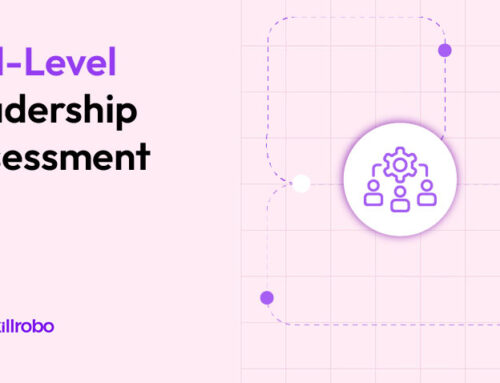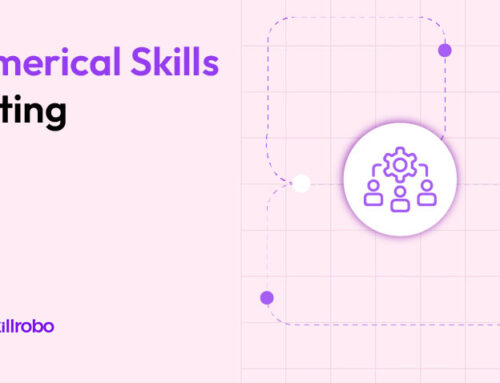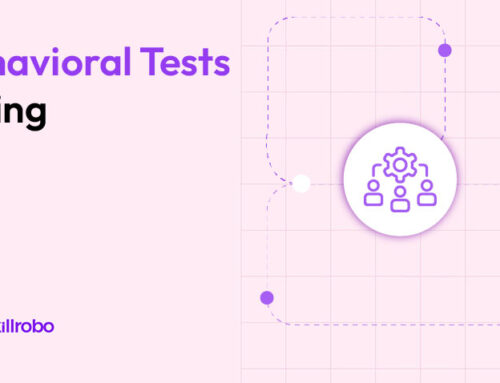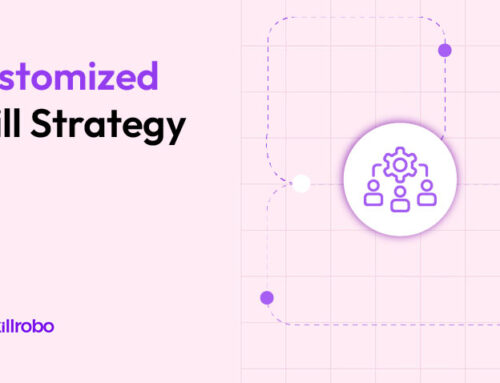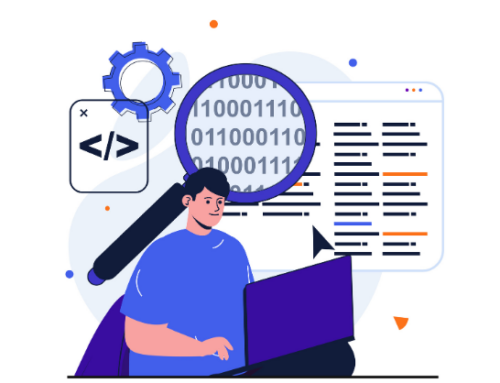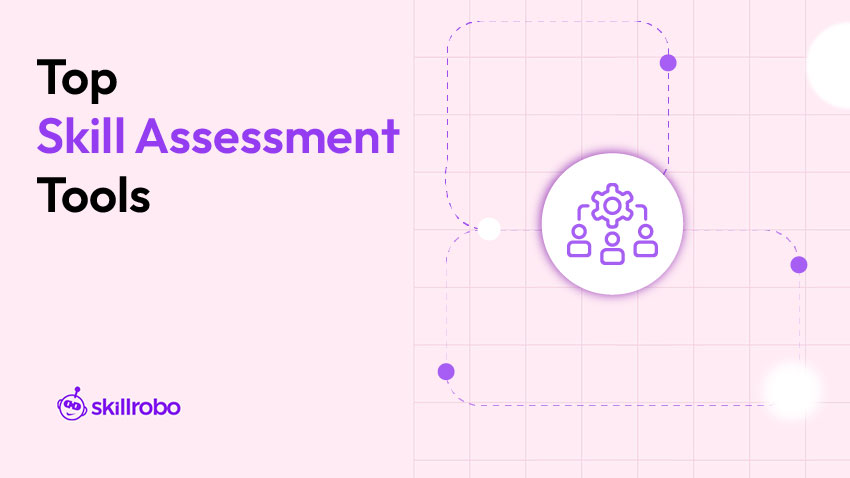
Key Takeaways
- Online skill assessment tools enable small businesses to hire efficiently by evaluating candidates based on real skills, reducing time-to-hire and improving talent quality.
- Customizable assessment platforms ensure role-specific evaluations that reflect actual job tasks, helping employers identify the most relevant candidates without generic testing.
- Automation features like auto-scoring and analytics help lean HR teams make faster, evidence-based hiring decisions with minimal manual effort or bias.
- Tools such as Skillrobo offer no-code customization, secure test delivery, and real-time reporting—empowering small businesses to scale hiring processes without increasing overhead.
Small businesses face unique challenges when it comes to hiring. With limited HR resources and tight timelines, they need tools that are efficient, easy to use, and budget-friendly. That’s where online employee skill assessment tools step in. These platforms simplify recruitment by offering pre-built or custom tests to evaluate candidates’ job-specific skills before making a hiring decision. From clerical assessments to communication skills evaluations, these tools help small teams make big decisions faster and more accurately. This blog explores the best online employee skill assessment tools for small businesses and how they can enhance your recruitment strategy.
Why Small Businesses Need Skill Assessment Tools
For small businesses, every hiring decision matters. Unlike large corporations, there’s little room for error—each employee plays a crucial role in daily operations and long-term growth. A poor hiring choice can lead to wasted resources, decreased morale, and lost productivity. Skill assessments offer a practical solution by introducing objectivity, speed, and confidence into the hiring process.
Here’s why they matter:
1. Time Savings
Skill assessments streamline hiring by filtering out unqualified candidates early in the process. Tools like those used for mass hiring situations allow small businesses to screen large applicant pools quickly. Pre-built tests and automated scoring help save hours of manual shortlisting, letting teams focus on top-tier candidates.
2. Reduced Bias
Hiring bias—whether intentional or unconscious—can derail recruitment. Using structured tools, such as competency assessment platforms, ensures every applicant is judged by the same standard. This promotes fair hiring and opens doors for candidates who might be overlooked in traditional interviews. customer interactions effectively—critical in service-based roles.
3. Improved Job Performance
By hiring for real-world competencies, not just resumes, businesses can expect stronger on-the-job performance. For instance, testing core communication skills using a communication skills assessment tool ensures the candidate can handle customer interactions effectively, critical in service-based roles.
4. Data-driven Hiring
With skill testing platforms, small businesses gain access to data that improves hiring accuracy. Features like instant reports and categorized scoring—available through tools similar to those used in employee assessment software—help HR teams back up hiring decisions with evidence rather than intuition.
When small businesses use smart tools, they can compete with larger firms on hiring quality, without a big budget.
What to Look For in a Skill Assessment Tool
Not all skill assessment tools are created equal, especially when it comes to the unique needs of small businesses. Limited resources, tighter timelines, and fewer hiring rounds mean you need a platform that delivers precision without complexity. The right tool should not only test skills but also fit seamlessly into your workflow.
1. Customizable
Your business isn’t generic—your assessments shouldn’t be either. Look for platforms that allow you to tailor tests based on role, industry, or department. Whether you’re hiring for a sales associate or a technical support agent, the tool should let you include role-specific questions, scenarios, or even behavioral assessments that reflect day-to-day responsibilities.
2. User-friendly
Ease of use is essential. The ideal tool should have an intuitive interface that makes test creation, distribution, and result analysis simple, even for non-technical users. It should also offer a smooth candidate experience: clear instructions, responsive design, and minimal friction in starting or submitting the test.
3. Affordable
Budget matters, especially for small businesses. Choose a solution with transparent pricing and no hidden fees for features like reporting, user access, or test volume. Many platforms offer tiered plans based on usage, making it easy to scale without overpaying. The best tools deliver value without straining your HR budget.
4. Insightful
A tool is only useful if it helps you make better decisions. That means more than just right-or-wrong answers. You’ll want real-time scoring, detailed breakdowns by skill area, and benchmarking data. Platforms like Skillrobo’s employee assessment suite provide visual dashboards and candidate ranking, allowing you to compare applicants objectively.
5. Secure
Finally, integrity is critical. Look for features like browser tab tracking, webcam monitoring, and anti-cheating alerts—especially if you’re testing remotely. These safeguards protect the legitimacy of your hiring process and ensure that test results truly reflect the candidate’s own capabilities.
These features ensure you’re not just collecting answers, but making decisions based on reliable data.
Top 10 Skill Assessment Tools for Small Businesses
Finding the right talent is critical for small businesses, but limited resources make hiring a challenge. Skill assessment tools offer a smart, scalable way to evaluate candidates objectively before making a hire. In this blog, we’ll explore the top 10 skill assessment tools that help small teams hire faster, better, and more confidently.
1. Skillrobo
Skillrobo is designed for startups and small businesses looking for flexibility. It offers customizable test creation, question libraries, AI-assisted generation, and instant reporting. With public test links and robust proctoring features, it ensures reliable, remote-ready hiring.
Best For: SMEs and remote teams need scalable, easy-to-use testing with minimal setup time and maximum accuracy across both technical and non-technical roles.
Top Features:
- SEYARC AI question generator for building tailored assessments quickly
- Proctoring tools, including tab tracking and webcam monitoring, for test integrity
- Public URL test access for seamless candidate distribution via career pages or email
2. Vervoe
Vervoe uses AI to grade open-ended responses and simulate real job scenarios. Its workflows are customizable, making it ideal for small teams that want depth in behavioral or soft skill evaluations.
Best For: Customer service, inside sales, and tech support roles where communication, judgment, and soft skills are essential for success.
Top Features:
- AI auto-scoring that evaluates written and video answers without manual grading
- Scenario-based assessments that reflect real workplace situations
- Customizable UX to match your brand and create a smooth candidate experience
3. TestDome
TestDome is ideal for evaluating both technical and general workplace skills through timed tests. It’s especially effective for small teams needing reliable screening without setup complexity.
Best For: Developers, data analysts, and entry-level roles where logic, basic coding, or business problem-solving are key evaluation areas.
Top Features:
- An auto-scoring system that provides immediate candidate performance feedback
- Soft skill tests, in addition to technical and cognitive challenges
- Clean UI that’s intuitive for both recruiters and candidates
4. Lingio
Lingio is tailored for businesses with multilingual or frontline employees. It simplifies the assessment process with gamified learning tools and mobile accessibility.
Best For: Retail, logistics, and hospitality teams hiring frontline staff who may require language support or onboarding in multiple languages.
Top Features:
- Multilingual assessments for inclusive hiring across diverse applicant pools
- Onboarding flows are integrated with training modules for new hires
- Gamification elements that improve engagement during testing
5. Xobin
Xobin is built for speed and scale. It helps small companies quickly launch role-specific assessments, especially when hiring at volume.
Best For: Startups and fast-growing businesses conducting bulk hiring for junior to mid-level roles across departments.
Top Features:
- Workflow automation to streamline test scheduling, scoring, and reporting
- Large question bank with over 1,000 questions for various industries
- Proctoring tools like webcam tracking and screen monitoring for secure testing
6. Codility
Codility is built for software engineering teams looking to maintain high-quality standards through hands-on coding tests and problem-solving assessments.
Best For: Tech startups and engineering-focused companies that need to assess real-time coding skills, debugging ability, and algorithmic thinking.
Top Features:
- Code playback to review the candidate’s problem-solving approach
- Live coding features for collaborative, interview-style sessions
- Challenge-based testing tailored to roles such as frontend, backend, or DevOps
7. Sapia.ai
Sapia.ai provides a fresh take on candidate screening with its chat-based assessments that evaluate soft skills and cultural fit using conversational AI.
Best For: Companies prioritizing inclusive hiring and behavioral screening for roles in HR, operations, or customer experience.
Top Features:
- Chat-based AI interviews that feel natural and mobile-friendly
- Predictive scoring based on language patterns and behavioral indicators
- D&I-focused insights to support fair and objective candidate evaluation
8. Glider AI
Glider AI combines assessment, proctoring, and interviewing into one seamless platform, helping growing businesses conduct structured, multi-skill evaluations.
Best For: IT services, consulting firms, and multi-role hiring teams needing technical and functional evaluations with integrity.
Top Features:
- Video interviews are integrated into the platform for one-stop hiring
- Scenario-based testing for assessing practical and job-specific skills
- AI-powered monitoring to detect anomalies and cheating attempts in real time
9. HiPeople
HiPeople focuses on culture-forward hiring by combining skill tests with personality assessments and automated reference checks, creating a holistic view of the candidate.
Best For: Small teams looking to evaluate soft skills, values alignment, and long-term cultural fit for roles in operations, support, or leadership.
Top Features:
- Personality insights that go beyond technical competency
- Reference automation that collects and analyzes referee feedback quickly
- Hiring scorecards that summarize evaluation across multiple hiring signals
10. Vervali Systems
Vervali Systems provides a lightweight assessment engine tailored to IT teams and agencies. Its emphasis is on fast deployment and easy customization.
Best For: Staffing firms and tech-driven small businesses hiring for coding or support roles who need quick and customizable testing.
Top Features:
- Custom templates for various roles that reduce test creation time
- Real-time dashboard analytics to track candidate performance at a glance
- White-labeled interface that reflects your brand during assessments
Tips for Small Teams Using Skill Testing Platforms
Small businesses don’t always have dedicated HR teams or time to trial complex tools. That’s why implementation should be strategic and incremental. Here’s how to make the most of your chosen assessment platform—without overwhelming your team or candidates.
1. Start Small
Don’t try to launch assessments across every department at once. Begin by creating a test for a single role that’s high-volume or business-critical. For instance, if you’re hiring in customer service, focus on one communication skills assessment and refine it based on feedback. Once you’re confident in the results and flow, scale up for other roles.
2. Combine with Interviews
Skill assessments are powerful filters, but they shouldn’t be the sole basis for hiring. Use them to identify the top candidates, then validate those results through structured interviews. This hybrid approach ensures you don’t miss great people who might perform better in a conversational setting, especially in roles that require interpersonal communication.
3. Monitor Metrics
The best platforms provide more than scores—they offer data. Track test completion rates, average scores, and correlation with post-hire performance. Are your top scorers excelling on the job? If not, tweak the test format or questions. Over time, this data-driven refinement improves both the quality and fairness of your assessments.
Conclusion: Smart Tools for Smart Hiring
For small businesses, every hiring decision matters. With limited resources and high stakes, relying solely on resumes or gut instinct is risky. Online employee skill assessment tools level the playing field—helping you evaluate candidates objectively, efficiently, and fairly.
Whether you’re building a lean team or scaling fast, tools like Skillrobo simplify the process with customizable tests, instant analytics, and secure testing environments—designed specifically for small teams with big goals.
Ready to hire with confidence? Click here to sign up and start creating your first skill-based assessment today.



